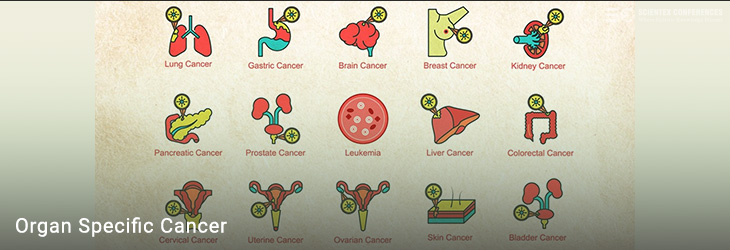Track: Organ Specific Cancer

The "Organ-Specific Cancers" session will explore the unique challenges and intricacies of cancers classified by the organs they impact. Gaining a deeper understanding of these specific cancers is essential for advancing targeted therapies and personalized treatment plans. This session will cover a wide range of malignancies, offering insights into current research, treatment strategies, and innovations in oncology.
Breast Cancer category will delve into its subtypes, including hormone receptor-positive, HER2-positive, and triple-negative breast cancer. Topics include advancements in early detection and precision medicine.
Blood Cancer category will highlight breakthrough therapies, including CAR T-cell therapy and stem cell transplants, that are revolutionizing the treatment of hematologic malignancies.
Brain Cancer like glioblastoma, are challenging. This category will discuss neurosurgical advances, radiation techniques, and targeted therapies that aim to improve outcomes for patients with these aggressive tumors.
Head and Neck Cancers (HSNCC) encompass malignancies of the oral cavity, larynx, and pharynx. This category focuses on multidisciplinary treatments that combine surgery, radiation, and chemotherapy while preserving critical functions like speech and swallowing.
Oral Cancers are typically linked to lifestyle factors like smoking and alcohol use. The category will discuss early detection, surgical innovations, and reconstructive options, emphasizing prevention and patient education.
Thoracic Cancers include Lung Cancer, a leading cause of cancer deaths. The category will explore treatments for non-small cell lung cancer (NSCLC) and small cell lung cancer (SCLC), focusing on immunotherapy, targeted treatments, and the role of early screening.
Skin Cancer like melanoma and Bone Cancer like osteosarcoma present unique challenges. Topics include new diagnostic approaches, targeted therapies, and advanced surgical techniques.
Gastrointestinal Cancers category includes cancers of the stomach, liver, pancreas, and colon. This will highlight multidisciplinary care, combining surgery, chemotherapy, and immunotherapy to improve patient survival and quality of life.
Endocrine Cancers, such as thyroid and adrenal cancers, and Neuroendocrine Tumors (NETs) will be covered, focusing on hormone-based therapies, surgery, and emerging radioligand treatments.
Prostate Cancer, kidney cancer, bladder cancer, and testicular cancer are critical areas of focus and will explore robotic surgery, active surveillance, and innovative systemic therapies that are shaping the future of Genitourinary Oncology.
Gynecologic Cancers including ovarian, cervical, and endometrial cancers, are significant concerns for women’s health. This will discuss genetic testing, advances in minimally invasive surgery, and targeted treatments.
Pediatric and Neurologic Cancers require specialized care. The category will focus on innovative treatment protocols, survivorship care, and ongoing research aimed at reducing long-term effects and improving survival rates.
Scientific Highlights
- Cancer Research Therapy and Autoimmune Diseases
- Cancer Biology and Biomarkers
- Types and Causes of Cancer
- Hematology in Cancer
- Organ Specific Cancer
- Cancer: Awareness, Lifestyle and Nutrition
- Oncology Subspecialties
- Advancements in Cancer Imaging Technologies
- Cancer Genomics and Epidemiology
- Cancer and Immunology
- Tumor Pathology and Cancer Cytopathology
- Cancer Pathophysiology
- Neuro and Radiation Oncology
- Stem Cell, Gene Therapy and CAR-T Cell Therapy
- Prevention and Palliative Care in Cancer
- Rehabilitation of Cancer Survivors
- Cancer Screening and Diagnosis
- Clinical Trials of Cancer
- Cancer Treatment and Traditional Therapies
- Complementary and Alternative Cancer therapy
- Artificial Intelligence in Cancer Research
- Future Technology in Oncology
- COVID-19 and Its Impact on Cancer


